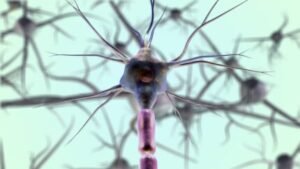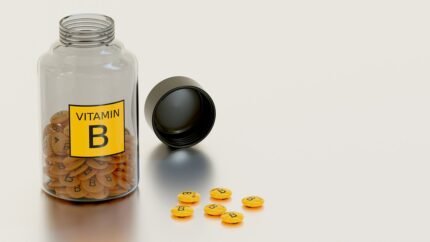Medically reviewed by Dr. Ramesh Gaddam, M.D. — Written by Sumalatha, D.N.H.E
Nerve damage can seriously affect your health, making it hard to move, feel, and function properly. It can cause pain, numbness, tingling, and weakness, making everyday activities difficult and lowering your quality of life.
Healing nerves is a complex process, and while the body can do some of it naturally, it often needs extra help.
Vitamins, especially B vitamins, are vital for nerve health. They help repair damaged nerves, support nerve function, and keep the protective layer around nerves healthy.
Knowing which vitamin B is best for nerve repair can help you support your body’s healing process.
By focusing on key vitamins, you can improve your recovery and better manage nerve damage effects.
1. Understanding Nerve Repair

Nerves are vital parts of your body’s communication network. They consist of three main components:
Neurons:
These are the cells that carry electrical signals.
Each neuron has a cell body, which contains the nucleus, and long, thin extensions called axons, which send messages to other neurons or muscles.
Myelin Sheath:
This is a protective covering that wraps around the axons of many nerves.
It helps speed up the transmission of electrical signals.
Synapses:
These are the junctions where one neuron communicates with another or with a muscle.
They release chemicals called neurotransmitters that carry signals across the gap.
Together, these parts allow nerves to send messages quickly and efficiently throughout the body, controlling movements, sensations, and various functions.
2. How Nerves Repair Themselves?

When nerves get damaged, the body has a few ways to repair them:
Regeneration of Axons:
If an axon is damaged but not completely severed, it can grow back.
The nerve will start to rebuild from the point of injury.
This process is slower in humans compared to some other animals, but it can still be effective.
Remyelination:
After an axon is damaged, the myelin sheath can also be repaired.
Specialized cells called Schwann cells in the peripheral nervous system help rebuild this protective layer around the axon, improving signal transmission.
Neuroplasticity:
The brain and nervous system have some ability to adapt and reorganize themselves.
This means that other nerves or brain areas can sometimes take over the functions of damaged nerves, helping to compensate for lost abilities.
2. Key Vitamin B Complex for Nerve Repair
1. Vitamin B12 (Cobalamin)

Vitamin B12 is crucial for nerve health because it helps form the myelin sheath, the protective covering around nerve cells.
This sheath is essential for the proper transmission of nerve signals.
Without enough Vitamin B12, nerves can become damaged, leading to problems with sensation and movement.
Sources:
Vitamin B12 is primarily found in animal products such as meat, fish, poultry, eggs, and dairy products.
For those who follow a vegetarian or vegan diet, fortified foods (like certain plant-based milks and cereals) and supplements are important sources to ensure adequate intake.
Symptoms of Deficiency:
A lack of Vitamin B12 can lead to several health issues, including:
- Tingling or Numbness: Often in the hands and feet.
- Weakness: Reduced strength and coordination.
- Cognitive Issues: Problems with memory, concentration, and mood changes.
Recommended Intake:
The recommended daily amount of Vitamin B12 varies by age, but for most adults, it’s about 2.4 micrograms per day.
To maintain adequate levels, you can consume foods rich in Vitamin B12 or take supplements if needed.
If you suspect a deficiency, it’s a good idea to consult with a healthcare professional for testing and personalized advice.
2. Vitamin B1 (Thiamine)

Vitamin B1, also known as thiamine, is important for nerve health because it helps support nerve function and glucose metabolism.
It assists in converting carbohydrates into energy, which is essential for nerve cells.
Adequate thiamine levels can be particularly beneficial for individuals with neuropathy, a condition involving nerve damage.
Sources:
Thiamine is found in a variety of foods, including:
- Whole Grains: Brown rice, oatmeal, and whole wheat products.
- Pork: Especially lean cuts and pork products.
- Legumes: Beans, lentils, and peas.
- Nuts: Almonds, sunflower seeds, and walnuts.
Symptoms of Deficiency:
A lack of Vitamin B1 can lead to several symptoms, such as:
- Fatigue: General tiredness and low energy.
- Irritability: Mood swings and emotional instability.
- Nerve Damage: Symptoms like tingling, numbness, and muscle weakness, especially in severe cases.
Recommended Intake:
For most adults, the recommended daily intake of Vitamin B1 is about 1.1 to 1.2 milligrams.
To ensure you get enough, include thiamine-rich foods in your diet.
If you have concerns about your intake or are experiencing symptoms of deficiency, consider speaking with a healthcare provider for guidance and possible supplementation.
3. Synergistic Effect of B Vitamins
Vitamins B12, B1, and B6 work together to support optimal nerve health in several ways:

Vitamin B12 (Cobalamin)
Helps maintain the myelin sheath, the protective covering around nerve cells, which is crucial for the proper transmission of nerve signals.
Vitamin B1 (Thiamine)
Supports nerve function and glucose metabolism, ensuring that nerve cells have the energy they need to operate effectively.
It is particularly beneficial for conditions like neuropathy.
Vitamin B6 (Pyridoxine)
Essential for the synthesis of neurotransmitters and the proper transmission of nerve signals.
It ensures that the communication between nerves and muscles is smooth and efficient.
Summary:
When taken together, these B vitamins enhance each other’s effectiveness, providing comprehensive support for nerve repair and maintenance.
They contribute to the overall health of the nervous system by ensuring that nerve cells are well-nourished, protected, and functioning properly.
4. Supplemental vs. Dietary Sources

Supplemental Sources:
Pros:
- Convenience: Easy to take and ensure you’re getting the exact amount you need.
- Targeted Dosage: Can provide higher doses of specific vitamins if you have a deficiency.
- Consistency: Helps maintain consistent vitamin levels, especially for those with dietary restrictions.
Cons:
- Potential for Overdose: Taking too much of certain vitamins can be harmful.
- Cost: Supplements can be expensive.
- Absorption Issues: Some people may not absorb synthetic vitamins as well as those from natural sources.
Dietary Sources:
Pros:
- Nutrient-Rich: Whole foods provide a range of nutrients that work together for better health.
- Better Absorption: Vitamins from food sources are often better absorbed by the body.
- No Risk of Overdose: It is hard to consume harmful levels of vitamins through food alone.
Cons:
- Dietary Restrictions: People with certain dietary restrictions (e.g., vegetarians or vegans) might find it challenging to get enough of some B vitamins, especially B12.
- Inconsistent Intake: It can be harder to ensure you’re getting enough of each vitamin consistently through diet alone.
Summary:
In conclusion, a balanced approach that combines both dietary sources and supplements (if needed) can provide the best support for nerve health.
It’s important to consult with a healthcare provider to determine the right strategy for your individual needs, ensuring that you get the appropriate amounts of these essential vitamins.
5. Tips for Optimal Nerve Health
Eat a Balanced Diet by including a Variety of Foods Rich in B Vitamins.

1. Vitamin B12:
Found in animal products like meat, fish, poultry, eggs, and dairy.
Fortified cereals and plant-based milks are good sources for vegetarians and vegans.
2. Vitamin B1 (Thiamine):
Present in whole grains, pork, legumes, and nuts.
3. Vitamin B6 (Pyridoxine):
Abundant in poultry, fish, bananas, potatoes, and fortified cereals.
4. Consider Supplements if Needed
If your diet doesn’t provide enough B vitamins, supplements can help fill the gap.
This is particularly important for people with dietary restrictions, certain health conditions, or higher nutrient needs.
5. Read Labels and Choose Wisely
When selecting supplements, opt for reputable brands and check the labels for the forms and dosages of B vitamins included.
Look for products that have been tested for quality and purity.
6. Monitor Your Intake
Track your food and supplement intake to ensure you are getting the recommended daily amounts of B vitamins.
This can help you avoid deficiencies and excessive intakes.
7. Seek Professional Guidance
Consult with a healthcare provider before starting any new supplement regimen.
They can help you determine if you need supplements and which ones are best for your individual health needs.
8. Get Regular Check-Ups
Regular health check-ups can help monitor your vitamin levels and overall nerve health.
Blood tests can check for deficiencies, especially for Vitamin B12, which can be hard to diagnose based solely on symptoms.
9. Discuss Symptoms and Concerns
If you experience symptoms like numbness, tingling, weakness, or mood changes, talk to your healthcare provider.
These could be signs of a B vitamin deficiency or other health issues that need attention.
Your healthcare provider can offer personalized advice based on your health status, lifestyle, and dietary habits.
They can also monitor your progress and make adjustments to your vitamin intake as needed.
6. How to Choose Vitamin-B Supplements?

Choosing the right Vitamin-B supplements can be essential for maintaining good health.
Here are some tips to help you make the best choice:
Check the Label
- Look for the types and amounts of B vitamins included.
- Ensure the product contains the specific B vitamins you need (like B12, B1, B6).
Choose Reputable Brands
- Opt for well-known and trusted brands.
- Look for third-party testing or certifications to ensure quality and purity.
Consider Your Needs
- Think about your dietary restrictions and health conditions.
- Choose supplements that meet your specific nutritional requirements.
Avoid Fillers and Additives
- Check for unnecessary fillers, artificial colors, and preservatives.
- Choose products with minimal additives.
Read Reviews and Get Recommendations
- Read customer reviews and ratings.
- Ask for recommendations from healthcare providers or pharmacists.
Consult with a Healthcare Professional
- Discuss your supplement needs with a healthcare provider.
- Get personalized advice based on your health status and dietary habits.
By following these tips, you can choose Vitamin-B supplements that effectively support your health and meet your nutritional needs.
7. Where to Buy Vitamin B Supplements
You can purchase high-quality Vitamin B supplements on Amazon.
Here’s a convenient link to explore a wide range of options:
Amazon offers a variety of brands and formulations, making it easy to find the supplements that best meet your needs.
Be sure to check customer reviews and product details to make an informed choice.
8. List of Best Vitamin B Supplements
List of Best Vitamin B Supplements based on user reviews on Amazon.com.
| Sl.No | Vitamin Brand | Store |
| 1 | View on Amazon | |
| 2 | USDA Organic Vitamin B-Complex
Made in USA Supplement, 2fl oz |
|
| 3 | Carlyle Vitamin B-12 5000mcg
|
|
| 4 | Nature Made Super B Energy Complex,
| |
| 5 |
| |
| 6 |
|
* As an Amazon Associate I may earn commissions if you make any purchases.
Frequently Asked Questions (FAQs)
Can B12 Repair Nerve Damage?
Vitamin B12 is crucial for nerve health and repair. It helps maintain the myelin sheath around nerves, which is essential for proper nerve function.
While B12 alone may not fully repair nerve damage, it supports the overall healing process and can alleviate symptoms related to nerve damage.
What Helps Nerves Heal Faster?
To help nerves heal faster, consider:
- A Balanced Diet: Rich in essential vitamins and minerals, including B vitamins.
- Regular Exercise: Improves blood flow and supports nerve health.
- Adequate Rest: Allows your body to repair itself.
- Healthy Lifestyle Choices: Avoid smoking and excessive alcohol consumption.
Should I Take B12 or B Complex?
Both B12 and B complex supplements can be beneficial:
- B12: Specifically supports nerve health and repair.
- B Complex: Contains all B vitamins, which work together to support overall nerve function and health.
Choosing between them depends on your specific needs. If you have a B12 deficiency, focusing on B12 might be sufficient. For broader support, a B complex might be more appropriate.
Is Vitamin E Good for Nerve Damage?
Vitamin E is an antioxidant that helps protect cells from damage.
It may support nerve health by reducing oxidative stress, which can contribute to nerve damage.
However, it is not a primary treatment for nerve repair but can be beneficial as part of a comprehensive approach.
Which Fruit is Best for Nerves?
Fruits rich in antioxidants and vitamins are good for nerve health. Some top choices include:
- Bananas: High in Vitamin B6, which supports nerve function.
- Berries: Packed with antioxidants that help protect nerves.
- Oranges: Rich in Vitamin C, which supports overall nerve health.
Which Vitamin Tablet is Good for Nerves?
Vitamin B complex tablets are generally good for nerve health, as they include multiple B vitamins that support nerve function. Specifically, look for a tablet that contains:
- Vitamin B12: For nerve repair.
- Vitamin B1 (Thiamine): For nerve function.
- Vitamin B6: For neurotransmitter synthesis.
Can I Take Neurobion Every Day?
Neurobion is a supplement that combines various B vitamins, including B1, B6, and B12, to support nerve health.
It is generally safe to take Neurobion daily, but it’s best to follow the dosage instructions on the label and consult with a healthcare provider to ensure it’s suitable for your needs.
What Drink is Good for Nerve Damage?
Drinks that are beneficial for nerve health include:
- Green Tea: Contains antioxidants that support nerve health.
- Smoothies with B Vitamin-rich ingredients: Such as spinach, bananas, and berries.
Which Juice is Good for Nerves?
Juices that support nerve health include:
- Orange Juice: Rich in Vitamin C, which is important for nerve function.
- Carrot Juice: High in Vitamin A and antioxidants that support overall nerve health.
References:
For more detailed information on how supplements can impact recovery after peripheral nerve injury, you can refer to the review of the literature in the article titled “The Impact of Supplements on Recovery After Peripheral Nerve Injury”.
This article provides an in-depth look at various supplements and their effects on nerve healing and recovery.
Also Read:
Blackberries: Benefits, Nutrition, Uses, Side Effects
Blueberries: Benefits, Nutrition, Uses, Side Effects
Medically reviewed by Dr. Ramesh Gaddam, M.D.

General Physician, Diabetologist, and Critical Care Specialist.
Discover more from Health Build-Up
Subscribe to get the latest posts sent to your email.


2 thoughts on “Which Vitamin B is best for Nerve Repair? (5 Best Sources)”
Comments are closed.